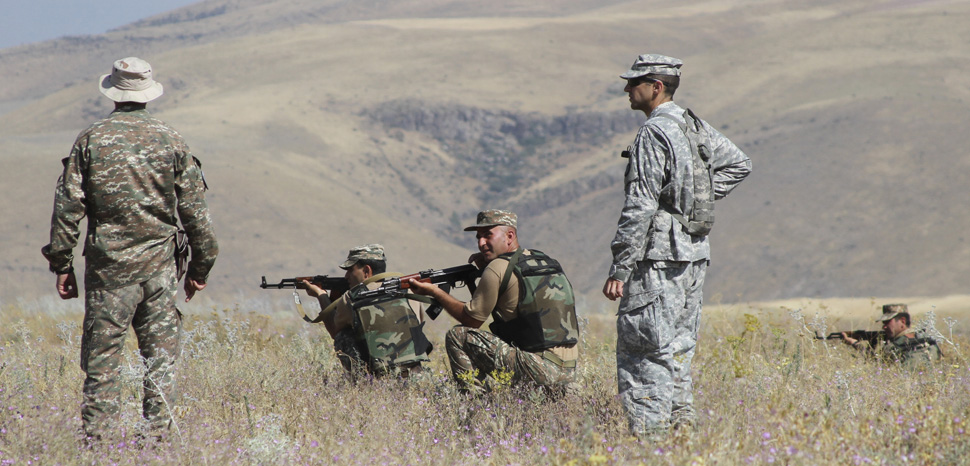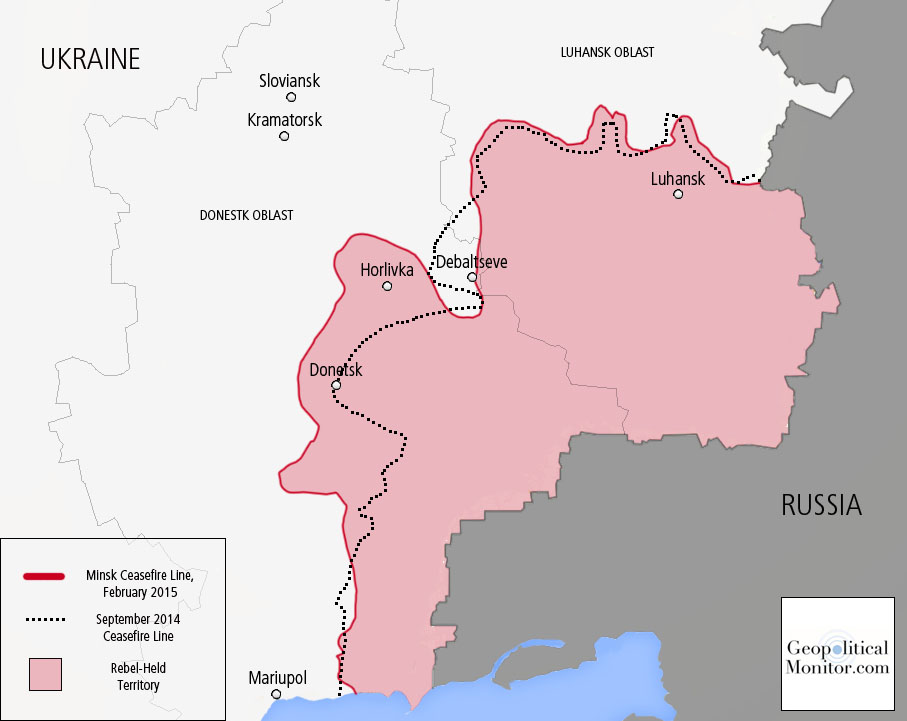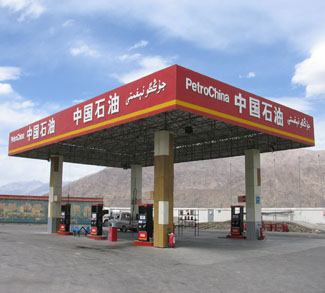Violent clashes have recently broken out between Armenia and Azerbaijan in the long-disputed Caucasus region of Nagorno-Karabakh. The area is internationally recognized as being part of Azerbaijan, but is inhabited primarily by ethnic Armenians. Once an autonomous region within Soviet Azerbaijan, from 1988 to 1994 it became the theater of a tragic war between the two communities. Since then, Nagorno-Karabakh has been de facto ruled by the self-proclaimed Republic of Artsakh, which is not recognized at the international level by any country, including Armenia. The issue has remained a ‘frozen conflict’ with sporadic clashes, the last of which took place in 2016.
But long-simmering tensions flared once again earlier this year. In July, following limited exchanges of fire in the region, crowds gathered in Baku calling to retake Nagorno-Karabakh. It wasn’t long before a new round of fighting broke out, drawing renewed attention from regional powers like Russia and Turkey. Fast-forward to the present and both sides are now locked in a cycle of escalation, which carries the real risk of a wider geopolitical conflict.
A local conflict with continental implications
Nagorno-Karabakh is a small mountainous region in the Caucasus located within Azeri territory, but in practice it is governed by its own self-appointed Armenian-speaking authorities. The conflict thus includes a clear ethnic dimension. Azeris are a Turkic Muslim Shia population, whereas Armenians are Orthodox Christians. Yet, both Armenia and Azerbaijan are small countries in the Caucasus squeezed between three far more powerful states. To the southeast lies Iran, which hosts a large Azeri community and maintains good ties with Baku due to the common Shia faith. To the north, apart from Georgia (itself wracked by long-standing ethnic conflicts) there is Russia, surely the power holding the greatest military might. Moscow has stakes in both Baku and Yerevan. It is economically involved in hydrocarbon-rich Azerbaijan, but as an Orthodox country it is friendly to Armenia and even operates a military base there. As a matter of fact, Armenia is part of the Russian-sponsored Collective Security Treaty Organization (CSTO), whose founding Treaty mirrors the mutual defense mechanism expressed in Article 5 of the NATO Treaty. In fact, the CSTO Treaty includes provisions (Article 4) stating that “If one of the Member States undergoes aggression […], it will be considered by the Member States as aggression […] to all the Member States of this Treaty.” It is important to note that this does not cover to Nagorno-Karabakh, as it is internationally recognized as part of Azerbaijan which is not a CSTO member. Lastly, to the west, NATO-member Turkey is pro-Azeri on the basis of a common Turkic heritage.
Such a landscape highlights the geopolitical complexity of the Caucasus (which is also an important transit zone for pipelines) and explains the reactions of various powers to the recent outbreak of violence. Russia has called for restraint and offered to mediate, and so did Iran. However, the warring parties rejected the offer. Both Moscow and Tehran are already involved in other conflicts (Ukraine, Syria and Libya for the former; Iraq, Syria and Yemen for the latter) and do not want another armed clash so close to home, especially one that could harm their economic interests via disrupted energy infrastructure in the Caucasus. Moreover, both have specific reasons to avoid a conflict. Iran does not want an escalation that may end up involving its own Azeri community. Russia, if called to intervene on the basis of the CSTO Treaty, is wary of possible Turkish action in support of Azerbaijan. The prospect of a direct fight with Turkey bears the risk of bringing NATO into the game. In fact, during the initial July skirmishes, Ankara had already openly expressed its readiness to protect Azerbaijan. Soon after the recent armed exchange began, it reiterated this commitment, sparking a new diplomatic spat with a non-regional power: France.
The government of President Macron was quick to react when the fighting started. France actually hosts a considerable Armenian community, but the reason for Macron’s move more likely stems from the country’s worsening relationship with Turkey due to Ankara’s assertiveness in Libya and the Eastern Mediterranean. In Libya, Ankara backs the internationally-recognized Government of National Accord in Tripoli, whereas Paris supports the Tobruk-based House of Representatives. In the Eastern Mediterranean, Turkey is pressing controversial maritime claims with military force and in one incident, a Turkish warship activated its targeting radar on a French unit. Later, after Turkey sent a seismic exploration vessel escorted by frigates to perform surveys in waters internationally recognized as being under Greek jurisdiction, France dispatched two Rafale fighters and a warship to the region and then signed a new weapon sales deal with Greece.
When the latest clashes erupted in Nagorno-Karabakh, Paris called for a cessation of hostilities, but the issue rapidly devolved into another row with Ankara. On September 30, an Armenian Su-25 attack plane was shot down, allegedly by a Turkish F-16 fighter – even though Ankara denies this claim. Following Turkey’s statement that “Armenia should withdraw from the territories under its occupation instead of resorting to cheap propaganda tricks,” France declared that it was “extremely concerned by the warlike messages” from the Turkish government, which in its opinion would embolden the Azeris to seize Nagorno-Karabakh. In response, Ankara declared itself “fully ready” to do “what is necessary” to assist Baku “both on the field and at the negotiation table” so that it can “take back its occupied lands.”
It is now obvious that the issue has taken on a broader international dimension, and if the situation in the Caucasus continues to escalate, the consequences could easily reverberate well beyond the immediate region.
The ‘July Crisis’ of 2020?
Turkey’s determination to support Azerbaijan raises concerns of an imminent Turkish military operation against Armenia. Considering Ankara’s recent adventurism and the nationalistic dimension that the issue represents, the prospect of violent conflict is not to be excluded. However, this brings some worrisome prospects.
As noted, Armenia is part of the CSTO, whose treaty states that an attack against one member would be considered an aggression against all. This means that, if attacked by Turkish forces, Armenia could demand military assistance from Russia. Again, Yerevan could not do this if the fighting were limited to Nagorno-Karabakh, as it is not covered by the CSTO Treaty. But if Armenia’s own territory came under attack and Moscow did not intervene, the credibility of the mutual defense pact it leads would fracture, as would the country’s image as a great power – something that President Putin draws his own domestic political legitimacy from. But a direct Russian attack on Turkish territory could lead Ankara (despite recent strains with other members) to trigger the NATO collective security mechanism.
Invoking Article 5 in such a way would give rise to a diplomatic dilemma for the Alliance and for its leading power, the United States; mainly, whether to assist Turkey and risk war with nuclear-armed Russia, or to abandon the increasingly problematic Turks (possibly under pressure from the powerful Armenian lobby in America) at the cost of seriously undermining NATO’s credibility.
In these terms, the situation bears dangerous similarities with the July Crisis that sparked WWI in 1914: a local conflict fomented by nationalism drags opposing military alliances into the fight and ends up in a global war. Nevertheless, this remains a remote scenario. First of all, no power has an interest in going to war over Nagorno-Karabakh, because none has major stakes in the issue. Therefore, the most likely end result is a negotiated settlement, maybe with the mediation of (relatively) neutral parties like the EU, the US, Iran or other states/organizations; but possibly even Russia itself. Second, if the clashes do not involve Armenia’s or Turkey’s soil, then there would be no legal basis for calling either alliance into action, since these territories fall outside the geographic scope of their respective treaties. Third, and most importantly, Russia and Turkey can still fight via indirect means and other proxy conflicts. The Syrian Observatory of Human Rights reported that Turkey transferred around 320 Syrian mercenaries from Syria to Azerbaijan. Similarly, Russia could set up ‘volunteer’ corps or dispatch mercenary forces (such as the Wagner Group) as it did in Ukraine, Syria and other countries.
As such, even though the conflict may locally escalate, the prospect of it turning into a wider conflict between great powers remains unlikely. Still, it is clear that the primary importance of ongoing clashes in Nagorno-Karabakh stems not from local territorial gains, but rather from the conflict’s ability to trigger a wider war between opposing alliance systems.




